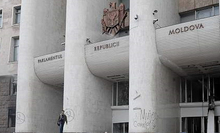
The recently elected parliament failed twice to elect a president. The situation throws the Republic of Moldova into new parliamentary elections, as the parliament is constitutionally obliged to dissolve after the second failure to elect a president
The elections for the President of the Republic of Moldova have failed. On 3 June, the Moldovan parliament organised repeat elections for president; the Communist candidate Zinaida Greceanîi obtained 60 votes, failing to find the necessary "golden vote". Thus, the situation throws the Republic of Moldova into new parliamentary elections, as the parliament is constitutionally obliged to dissolve after the second failure to elect a Moldovan president.
Incapable of dialogue
The deep political crisis in the Republic of Moldova directly results from the inability of different political actors to initiate dialogue and compromise. The political antagonism, cultivated by Communist party behaviour during the last eight years, has reached an unprecedented level that now excludes any consensus.
The opposition parties have contested the legitimacy of parliamentary elections held on 5 April and called them a fraud. Intending to provoke new parliamentary elections, the parties consequently announced their refusal to participate in parliament's election of the president of the Republic of Moldova. Due to the alleged fraud, the subsequent violent protests and the abuse of those arrested, the opposition has identified their boycott as the only moral solution, stating that the people deserve a fairly elected parliament and a real democracy. Just minutes before the parliamentary vote should have taken place, Vlad Filat, the leader of the opposition Liberal Democratic Party declared, "The election of the president would mean the legalisation of the fraud committed by the Communists on 5 April."
On the other hand, the Communist party, after claiming victory in the 5 April elections, has rejected any attempt to have a dialogue with the opposition. They intended to use individual negotiations to obtain the one missing vote necessary to elect the president. The opposition called this move "political corruption". When the Communist party failed to obtain the missing vote, a change of strategy was needed; nonetheless, the inability to hold an equal dialogue with its opponents transformed the negotiations with the opposition into a wasted effort. The last attempt to force the opposition to vote the Communist candidate for the Presidency, by raising the spectre of the economic crisis, has failed.
The regrouping of the opposition
The news of fresh parliamentary elections came as manna from heaven for many opposition parties that did not obtain the 6% threshold to enter parliament. The leaders of the three foremost parties of social-democratic orientation - Democrat Party, Social Democrat Party and Centrist Union - have already announced their idea to increase their chances of entering parliament by joining together in the new election and not repeating the mistake of fighting separately as they did in the previous election.
The three parliamentary opposition parties - Liberal Party, Liberal-Democrat Party and Our Moldova Alliance - are also considering close cooperation in order to obtain a better total result than they did on 5 April. They also did not exclude the possibility of a common list, but that depends on which strategy could bring more votes.
Another important factor should be noted when considering the opposition's chances. During the last weeks, rumours increasingly circulate that one of the most significant leaders of the Communist party, Marian Lupu, the former president of the Moldovan parliament and highly appreciated both in the European capitals but also in Moldova, is considering leaving the Communists and joining one of the opposition parties. Until now, Marian Lupu was ambiguous in confirming or denying those rumours; nonetheless, his decision is expected to be announced soon. If he decides to leave the Communist party that could significantly shake the popularity of the ruling party and increase the opposition's chances for a better result in the elections.
Elections date
While the political actors already prepare for elections, the parliament has not yet been dissolved, as the Communist party has decided to vote in a new government before dissolving parliament. The previous government has resigned; therefore, the country needs a new acting executive power. Still, the new government will be short-lived, since it will be active only until the newly elected parliament will have its first session. On 10 June, the parliament is supposed to vote on the new government; then the acting President Vladimir Voronin will probably dissolve the parliament and announce the date of the parliamentary election. The new elections will be held within 45 days from the moment the parliament will be dissolved; thus, the elections would be held in late July or early August.
Complicated campaign
The electoral campaign for the new parliamentary elections will be very difficult and dirty. Immediately after the opposition blocked for the second time the elections of the president and thus provoked new parliamentary elections, the leader of the Communist party Vladimir Voronin accused the opposition of working against the independence of the state and being controlled by external forces.
Most definitively, during the campaign, the Communists will campaign on the violent events of 7 April to imply that the opposition attempted a coup d'etat and present the failure to elect the president as of the same logic as a coup d'etat.
Meanwhile, the opposition will focus on the abuses committed against those arrested after the 7 April events and will accuse the authorities of orchestrating the violence in order to distract attention from the alleged fraud committed in the parliamentary elections of 5 April.
Success in the future campaign will depend on how the opponents will be able to bring their story to the people. Because government authorities control almost all television broadcasters with national coverage, the opposition will have to make a huge effort to spread the necessary information by going from person-to-person.






